Jennie Goutet's Blog: A Lady in France, page 11
February 7, 2017
Entitlement
My husband and I discovered that there is no direct translation in French for expressing the sense of entitlement. You can only say that you feel something is your due, which is a more cumbersome way to say it. It loses the punch factor. It sounds ugly, but less ugly.
2016 – and now the beginning of 2017 – has been a series of unfortunate events. You all know about the house travesty: hiring a carpenter named Jesus (not Hay-sus), whose wife is named Mary – after we had prayed for a sign that God would show us which contractor to use – only to have his business come very close to folding after we had given him nearly all the money. We are waiting to see if he can come finish the work and patch all the damage the initial stages have made in our living space.
And you may remember the car frustration, where a nanny hit our car and we gave her the insurance to sign but her employer never got back to us. We paid nearly 500€ out of pocket and I forgave the nanny the debt (with loud cries and tears in the privacy of my own home). In a twist of fate, the son of this family invited mine to a birthday party not knowing it was our car that was hit. I left a very nice message saying I’d like to understand what happened with the insurance form now that I had her number. And I hope that my insisting a bit still counts as forgiveness. If the woman doesn’t respond I won’t harbour ill feelings towards her. But I don’t think my son will be in attendance.
Then this year, thinking to do the smart thing, I hired a lawyer to set up an LLC in Delaware – to record my book expenses and earnings. That way I could declare my expenses and get a tax break. The thing is, I know how to set up an LLC. I’ve done it before. But I was hiring him for his international tax expertise. He charged me an exorbitant rate, told me any further questions would need to be billed, and was actually WRONG about my ability to use an LLC because I can’t even set up a US business banking account from overseas. So I’ve paid all that money and I’m back to square one. I cried loud and bitter tears over that too – over the unfairness of it all.
Many of you have read my smashing the plate post about one of our infrequent marital fights. What I haven’t mentioned on my blog – but what we talked about in our recent church marriage retreat – was another fight we had a week after that episode. My husband was supposed to attend a parent-teacher meeting for one of our children and he knew about it 2 weeks in advance, but only told me he couldn’t go a couple hours before the appointment was supposed to take place (because of a call he knew about longer than 2 weeks). It didn’t help that he came to see me with his earphones in and the conference call on mute. (More on that in a minute, but my husband and I are good). 
February 2, 2017
Thank You
This is a short post to say hi and pass on a thank you. I’ve heard from the HOPE School in Chennai, and they have a little message for you:
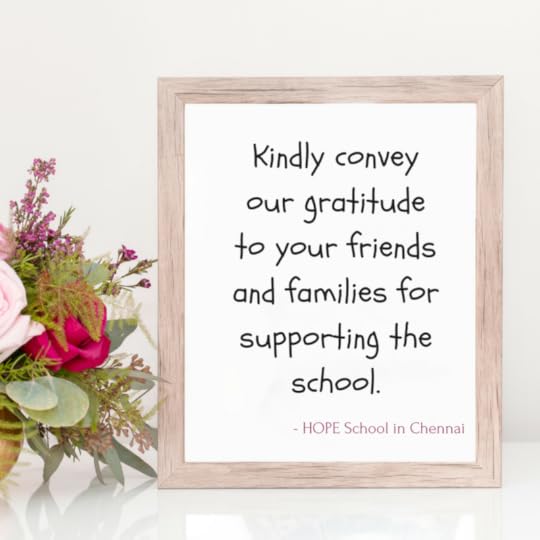
Thank you to everyone who contributed (and if you missed the post that talks about the HOPE School, you can see it by clicking here).
They said that the BrainQuest resource books are particularly helpful for the younger classes and sent a picture of everything you contributed so you can see what you purchased! 
January 27, 2017
Final Postcards from India
I wanted to finish recounting our India trip through pictures. Lots of pictures, fewer words. Are you ready?
First – CHENNAI
The day after we arrived, the kids were asked to come speak to the local school. Among the questions the students asked was, “How do you conserve water in France?”
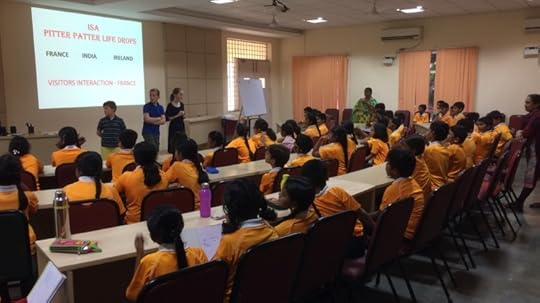
Not having the same worries of water conservation as Indians face, our French children answered blithely : “In the fridge and from the tap.”
There were an enormous amount of trees down from the cyclone a week before we came. The destruction was everywhere, and this was after they had cleared most of the roads.
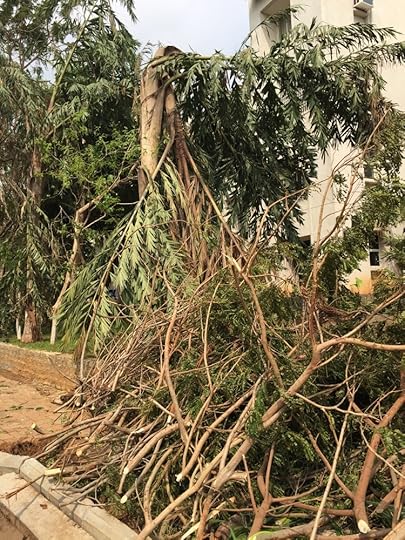
It was such a shame. Some of them were really old trees.
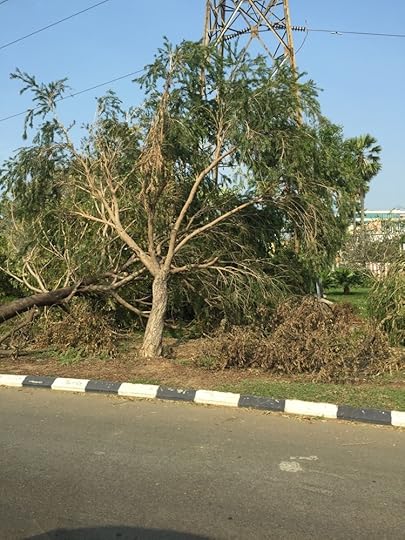
I spoke about Venkatesh (the driver’s) village. Many of the villagers farm bananas and coconuts. The coconut water tastes more salty here than it does in the mountains of Kerala. Not everyone liked it.
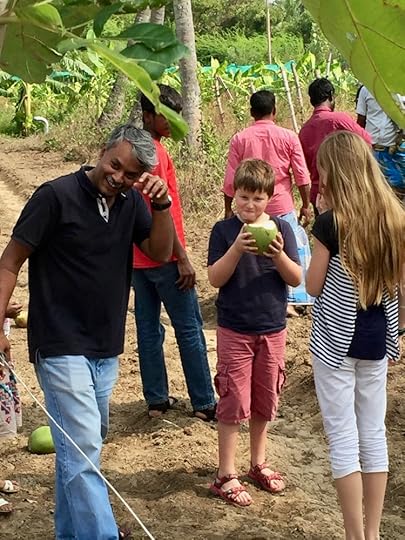
Next – PONDICHERRY
Two days after we landed, Hisill took us to stay in a timeshare in a beautiful resort in Pondicherry. We were greeted with welcome bindis! (I’m not sure if they’re called this).
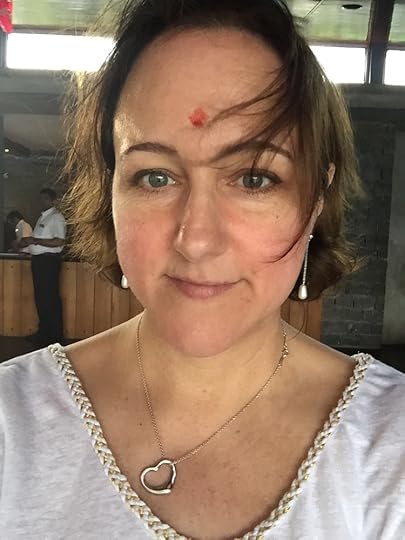
We were the only Westerners there and I didn’t dare swim because I didn’t have a bathing suit with short sleeves and a skirt. But we had nice accommodations and good food. This is Juliet and me choosing some local skirts so we could fit in better.

Pondicherry (or Ponducherry, or Pondichéry in French) is on the southeast coast of India, and it’s a former French colony. See the French influence in the buildings, street sign, and flag?
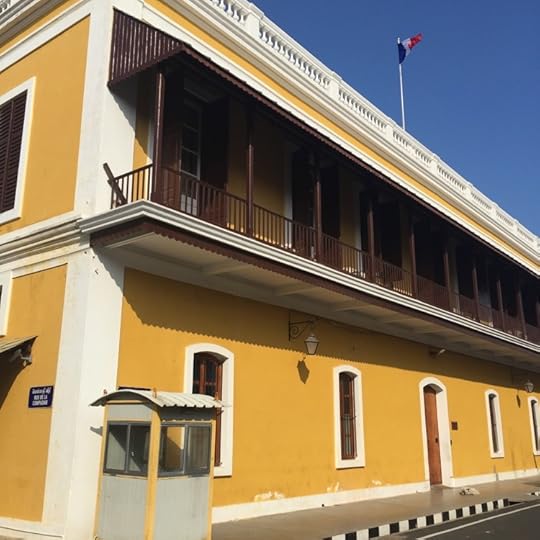
French folk in the former French colony. Salut!
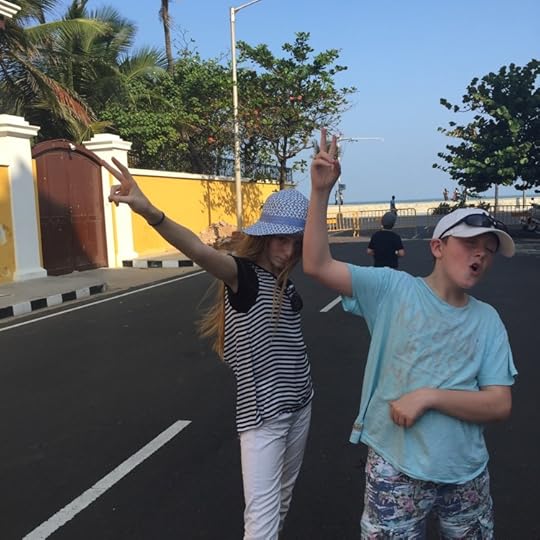
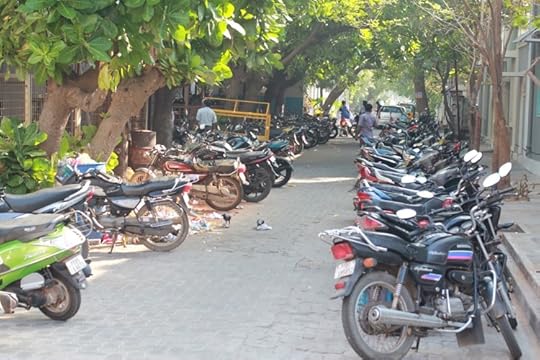
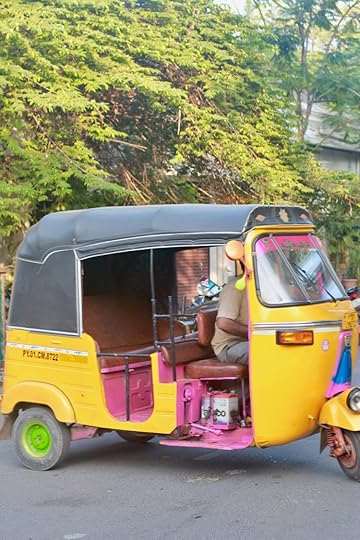
There were stray dogs everywhere and it seems they live in mutual tolerance with humans. You don’t mess with me and I won’t mess with you. They slept a lot on the hot concrete.

The three oceans that surround India are: the Arabian Sea, the Indian Ocean, and the Bay of Bengal. Pondicherry is on the coast of the Bay of Bengal, and if you go to the very most southern tip of India, you can see where all three bodies of water converge. (We didn’t get to go there).

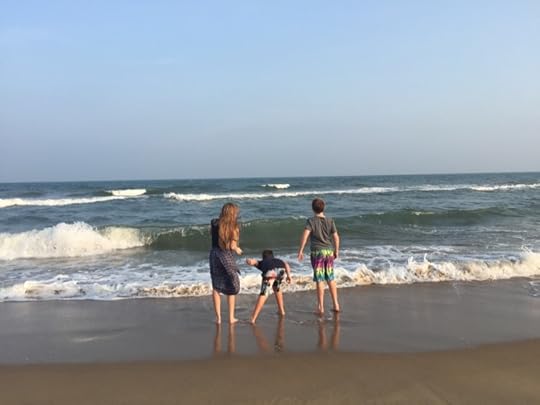
The waves were too strong, so we didn’t swim. Just appreciated.
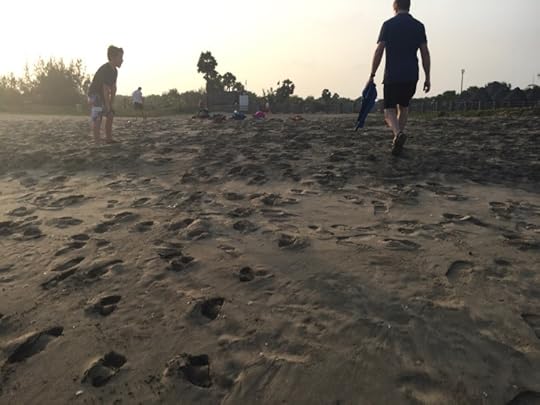
Last – KERALA
This is in the tourist (and unbelievably charming) town of Thekaddy.
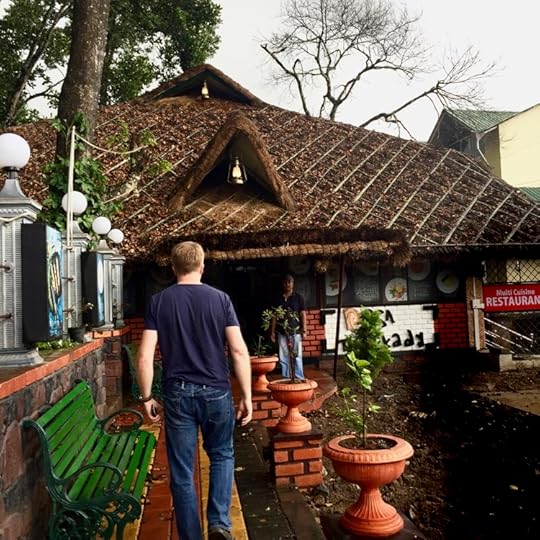
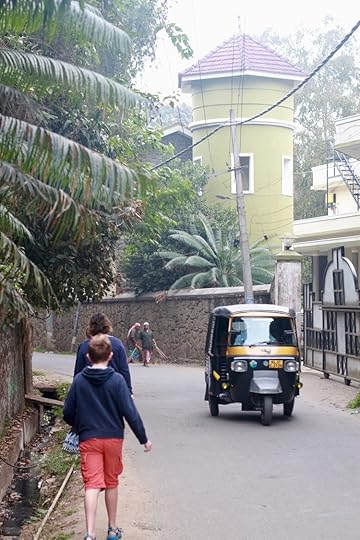
Monkeys!
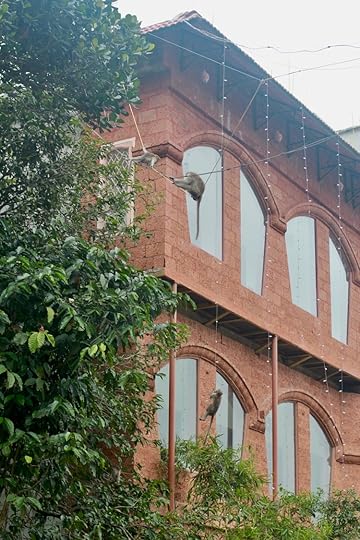
And more monkeys!
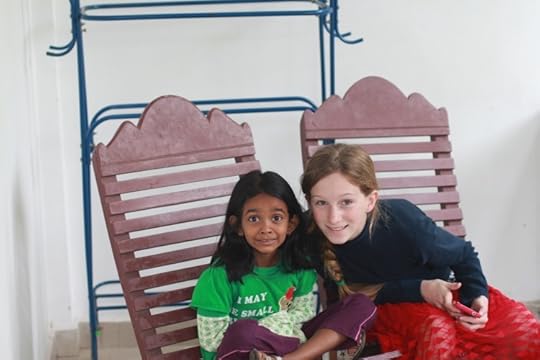
Ha! 
January 23, 2017
Stories of Faith
Hi friends. It was hard for me to write today because I’m feeling depressed by the political climate. Just saying those words is a freeing thing and so I’m saying them, but I’m not going to go into particulars because I want this to be a unifying sort of post rather than a divisive one.
But it’s hard for me to choose my battle, to know where to put my energy. As such, it’s been hard for me to do things like follow the nutritionist’s plan, or write, or listen to my kids – you know, the things that are good for me (or them). I’m hoping that by saying these words, it will help me in those areas too.
So today, instead of elaborating on how frozen I feel by everything, I’m going to tell you a few stories of faith from India. We brought them supplies, and they sent us back with stories of faith.
First, let me tell you about Venkatesh’s village. Twenty years ago, this village was run-down, poverty-stricken, and crime-infested, with constant police raids. Twice, someone of faith came and attempted to convert the villagers, whose main income was derived from home-brewed bootleg alcohol. Twice, the pastors were sent away with their tails between their legs.
Until … along came a new pastor. He was nothing much to look at. A humble guy who limped. But in this Hindu village, they noticed that he prayed a lot. And they noticed that when they brought someone to him who was sick, the person very often got better. That’s when they started to put their trust in what he was saying, and believe.
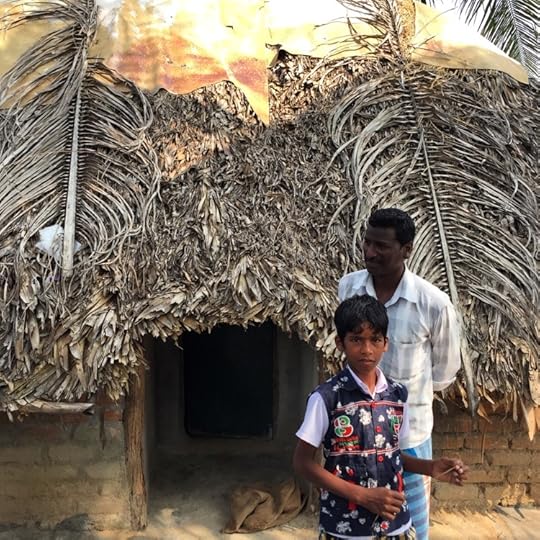
Venkatesh became a Christian after his mother believed, and when he was ready to marry, the family searched for a wife who was also a believer. Now they’re raising their two girls that way. When Hisill was looking for a driver, he went to this village to search for someone who needed a job. He instantly hit it off with Venkatesh and paid for him to get a driving license since he had no particular skill. And that’s how he began his career driving for Hisill.
Now their village is a clean and happy place to live. The pastor is still there serving the community, and the majority of the people who live there are farmers of rice, bananas and coconut. There’s no more bootleg spirits. Instead they’re filled with Holy Spirit.
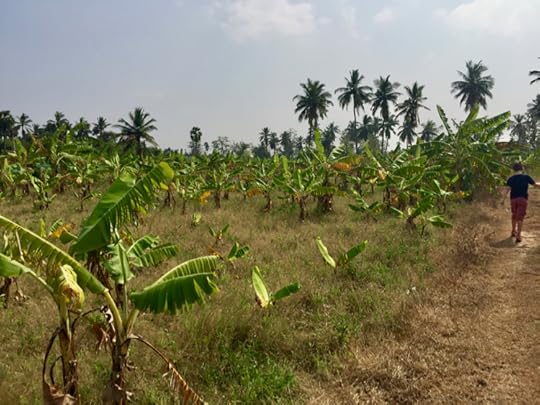 Nalini was Brahmin, which is the highest caste in the Hindu religion. From what I understand, the caste carries the faith forward through sacred learning and priestly duties, and belonging to this caste carries some responsibility.
Nalini was Brahmin, which is the highest caste in the Hindu religion. From what I understand, the caste carries the faith forward through sacred learning and priestly duties, and belonging to this caste carries some responsibility.
So her family did not take too kindly when she became a Christian at the age of eighteen. They used to beat her regularly because of her faith, and once, her brothers came to where she was worshipping and dragged her home by the hair.
There was even a period of one month when her family locked her into her room, opening the door only to bring her food. She had no Bible with her to keep her faith up and had to remember the verses she learned by heart; but she refused to back down. Now she’s a couple decades in the faith, married, with children, and at peace with her family. Those family tensions in her young adult years did not break her, and her faith did not buckle under the pressure.
Nalini’s faith inspired Hisill, who was only fifteen when he became a Christian, along with his older brother. He saw what she went through and how she persevered, and he was encouraged to do the same. Now, his family was Syrian Catholic so please don’t get the wrong idea when I use the term “became a Christian”. I’m making the distinction between an inherited faith and a faith that was all his own. A faith in which Jesus is Lord.
The Syrian Christians of India are also called Saint Thomas Christians because they date their faith back to the apostle Thomas, who – it is widely believed – brought Christianity to India and was also buried there. Similar to the Brahmin caste, having a Syrian Christian origin carries some prestige so when a teenage Hisill (young upstart that our friend was) decided to leave the faith and go towards a simpler form of Christianity – where rituals were out and discipleship was taught – his family was less than pleased.
He also got his share of beatings, along with his brother, and they were also chased from home more than once where they had to sleep outdoors. And when his family decided they would move to a new city to get away from the negative influence of this new church he had joined (I say this with affection since it’s my church), Hisill and his brother taught the Bible to – and baptized – so many people in the new city, the church had to send an evangelist to the town to lead the church those teens had planted there.
I hope you can hear in my words that I’m not proposing that one expression of faith is superior to another, but only to make the distinction between a heart that is touched by a life-changing faith in Jesus, and one that is content with the ceremony. I’m hoping to inspire you by what a teenager can do when lit by a radical faith.
Unlike the prestigious Brahmins or Syrian Christians, we met another woman who grew up on the fringes of society – in a brothel, where her mother was a prostitute. She heard the Word of God and became a Christian, and today, this gentle young woman lives a life of faith – married and with two children, serving the poor. This is only a snippet of a story, but one that shows that, with God, there is no caste. There are no “untouchables”.
I have one last story that Hisill’s wife, Jobby, told me about. A sister in their church had a midwife who stayed on to help with the early care of her children. This woman was a Hindu. A few years after she had left her employment, the sister heard that the midwife had throat cancer, which was in the late stages. She decided to see if the midwife was interested in studying the Bible.
She was, and Jobby went with her to begin these studies at a time when the woman could no longer talk because she had a hole in her throat, with a breathing and feeding tube. Never mind that small impediment! She enthusiastically participated in the Bible studies using gestures. She confessed her sins using gestures. She expressed her willingness to make Jesus Lord and get baptised using gestures. And the grand day came when they were ready to baptise her.
Jobby and the sister feared some opposition because the midwife lived in a slum where the residents were Hindu and the woman’s son was Muslim. They weren’t sure if they would be allowed to study the Bible with her, and they weren’t sure if they would be allowed to baptise her.
On top of it, on the day of her baptism, they arrived only to discover there was no water coming out of the city pipes. The neighbours, instead of chasing them away, said, “What? You want to get baptised for the forgiveness of your sins? We’ll help!” Forgiveness of sins is something Hindus can connect to. And they all came, each carrying a large bucket of water out of their precious stores so she could fill the barrel she was to get baptised in (only up to her shoulders because she had the breathing tube in).
She became a Christian a week before she died.
I know we are all at different stages in our faith. Of course we are! Our relationship with God is highly personal. But what these stories remind me is that God is doing miracles every day all around the world in reaching people, whether we have not the remotest article of Christian instruction in our lives or whether we’re bathed in the tradition but have lost touch with the intimacy of having a relationship with God.
This is what I’m reminded of when I hear these stories and it makes me give glory to God.
From one man he made all the nations, that they should inhabit the whole earth; and he marked out their appointed times in history and the boundaries of their lands.God did this so that they would seek him and perhaps reach out for him and find him, though he is not far from any one of us. ‘For in him we live and move and have our being.’ (Acts 17)

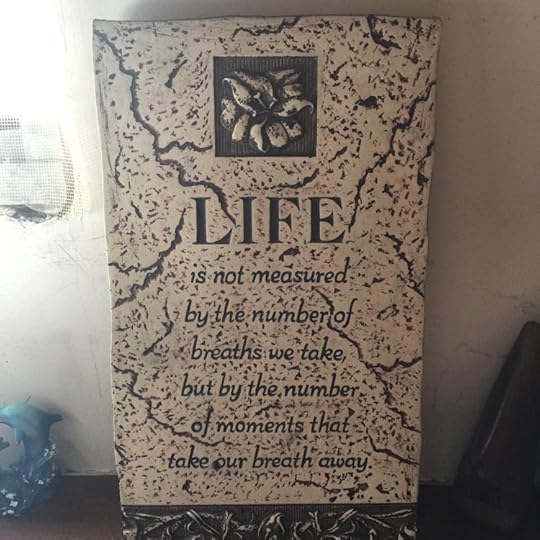
The post Stories of Faith appeared first on A Lady In France.
January 18, 2017
French Recipe for Leeks
My mother-in-law made this traditionally French recipe for leeks when we went to their house a week ago for lunch. I thought it was delicious and decided to reproduce it. The kids were not huge fans, I have to say.
Who cares. More for the adults! 
January 16, 2017
Striking the Rock – a lesson on marriage
I’ve talked about how hard it’s been here over the past year. There have been deaths and serious illnesses of friends and in the family. We’ve suffered recurring distress that I probably won’t ever be able to talk about on the blog because it involves more than just me. (I am wide open when it comes to my own life, but I don’t have that liberty when it comes to other people’s lives).
Someone crashed into our car and refused to take responsibility for it. Of all these things – without factoring in the loss of loved ones – what was probably the greatest hardship is that we hired a reputable construction company who came in and basically destroyed our house. Never mind that it wasn’t intentional. Never mind that the guy who owns the company is on the brink of ruin and is probably too depressed to call us back. We are looking at a house full of holes and mold, broken window guards and broken marquise… with no means to hire another company to correct and finish the job.
My husband and I have a peaceful marriage. Our fights are few and far between, and to his credit, he’s a peacemaker. A non-reactionary. To mine, I can see quickly when I’m wrong, and I’m a good apologizer. Those of you who’ve been married any number of years are not likely to be surprised when I tell you that this pressure that threatens the peace and stability of our home, going on a year now, has caused more fights between us than everything else we’ve faced put together. Even the year’s unemployment and collapse of our church following 9/11.
I’m a go-getter. My husband’s a strategist.
I’m a warrior. My husband’s an ambassador.
I’m rash. My husband is cautious. In the grand scheme of things, we’re a good match. We balance each other out. But the situation in our house has caused each of us to struggle in different ways, and it’s caused each of us to react in different ways. And it was over this difference in reacting that I lost it Friday morning.
There are no screaming matches between us. But when I feel my words are failing to sink in and we are at an impasse, I’ll get up and get busy. I’ll open the windows and fling open the iron shutters with a satisfying clatter. I’ll yank open the dishwasher and let the dishes rattle as I put them away with loud clanks. And when I saw my husband quietly making his good escape to sort out his thoughts in his own way – when I heard the door close – I did something I’ve never in my life even been tempted to do. I looked at the porcelain dish in my hand, and without a second thought, I hurled it on the floor with the greatest force I could muster, and listened to it smash.
It felt satisfying.
It did. There was an immediate need to get the broom and dustpan, of course, and sweep all the larger fragments into piles. And then I knew I needed to vacuum immediately or someone (probably me) would end up with a shard in the foot and would probably have to return to the emergency room to have it taken out. An experience I was not keen to repeat.
The first thing I noticed in cleaning was how far-reaching the effects of the smash were. There were porcelain bits in other rooms that were not even in the direct trajectory of the kitchen. I was astonished that the pieces could reach that far, and obtain such obscure resting places.
Having to tidy the mess I made gave me occasion to think. It made me think how far anger reaches. How that rash, satisfying explosion of anger can creep into places we could never see coming. How it affects people and future circumstances we never imagined would be affected.
It didn’t take much sweeping before I was able to see the real problem with smashing a dish. The plate was cheap and the act seemingly innocuous, but while it might once have been cute and forgivable (I’m not talking about God’s forgiveness, which covers everything, but more in the sense of being understandable), at 21 years in the faith, it’s no longer the case. Before I had picked up all the pieces, I was convicted that I had sinned against God.
The truth is, anger is not one of my major struggles. I could have resisted the urge. Maybe someone else needs more grace in the area of anger, like I need more grace in the area of greed – you know when it’s THE major character struggle? But anger is just not mine. I smashed the plate because I felt like it, and I wanted to express LOUDLY my discontent. And that’s all.
The situation reminded me of Moses in the desert when the Israelites grumbled because there was no water.
The first time this happened, Moses went to God with the complaint. He warned the people that their complaints were not against him, but against the Lord Almighty, and he urged them not to test God in this way. He not only helped them to see the broader spiritual picture, he got them the water they needed.
The whole Israelite community set out from the Desert of Sin, traveling from place to place as the Lord commanded. They camped at Rephidim, but there was no water for the people to drink. So they quarreled with Moses and said, “Give us water to drink.”
Moses replied, “Why do you quarrel with me? Why do you put the Lord to the test?”
But the people were thirsty for water there, and they grumbled against Moses. They said, “Why did you bring us up out of Egypt to make us and our children and livestock die of thirst?”
Then Moses cried out to the Lord, “What am I to do with these people? They are almost ready to stone me.”
The Lord answered Moses, “Go out in front of the people. Take with you some of the elders of Israel and take in your hand the staff with which you struck the Nile, and go. I will stand there before you by the rock at Horeb. Strike the rock, and water will come out of it for the people to drink.” So Moses did this in the sight of the elders of Israel. (Exodus 17:1-6)
Moses obeyed God, he struck the rock, and water flowed out to meet the needs of the people. That is a beautiful story.
But after much time had passed in the desert (and much time had passed in my marriage – are we still dealing with this same issue?), when Moses was growing old in both years and in the faith – at a time when his intimacy with God should have brought about a faithful response, a similar scenario occurred. This is what happened in Numbers 20:
Now there was no water for the community, and the people gathered in opposition to Moses and Aaron. They quarreled with Moses and said, “If only we had died when our brothers fell dead before the Lord! Why did you bring the Lord’s community into this wilderness, that we and our livestock should die here? Why did you bring us up out of Egypt to this terrible place? It has no grain or figs, grapevines or pomegranates. And there is no water to drink!”
Moses and Aaron went from the assembly to the entrance to the tent of meeting and fell facedown, and the glory of the Lord appeared to them. The Lord said to Moses, “Take the staff, and you and your brother Aaron gather the assembly together. Speak to that rock before their eyes and it will pour out its water. You will bring water out of the rock for the community so they and their livestock can drink.”
So Moses took the staff from the Lord’s presence, just as he commanded him. He and Aaron gathered the assembly together in front of the rock and Moses said to them, “Listen, you rebels, must we bring you water out of this rock?” Then Moses raised his arm and struck the rock twice with his staff. Water gushed out, and the community and their livestock drank.
But the Lord said to Moses and Aaron, “Because you did not trust in me enough to honor me as holy in the sight of the Israelites, you will not bring this community into the land I give them.” (Numbers 20:2-12)
At first glance, you think – what’s wrong with striking a rock? That’s what God told him to do the first time, so why is it a sin now? And was it such a big sin that he had to be excluded from the promised land? Come on, God! Isn’t that a little harsh?
Moses sinned because he was angry. He sinned by taking God’s glory for himself (as if he was the one who brought forth the water). He sinned by misrepresenting God – anger instead of grace. Moses spent 40 days on the mountain of the Lord communing with God! He should have known and trusted God enough to listen, and to meet the needs of the people the way God instructed him to …
Speak to the rock.
Instead, he vented his spleen. I hadn’t even vacuumed up the last shard before I was convicted of my sin before God. I hadn’t finished cleaning before I was asking God’s forgiveness and realising, you know what? No matter how convinced I am that my husband should deal with the contractor situation my way rather than the way he’s doing it, I would rather be right with God than be right.
And that pretty much rings true across the board whether it’s dealing with marital conflicts, handling political turmoil, or facing different ideas on what it means to practicing holiness. I would rather have God’s approval than be right.
That same morning, I told my husband what I’d done and what I had learned. In turn, he shared with me how he had gained certain convictions about what he needed to do, and then he did them. The conversation brought us closer.
We’re still stuck in the construction mess … for now. The circumstances haven’t changed – that was the theme song of 2016, by the way 
January 13, 2017
Humanitarian Visits in India
There were four places we visited with a humanitarian aim while in India. The first was Rocky’s house.
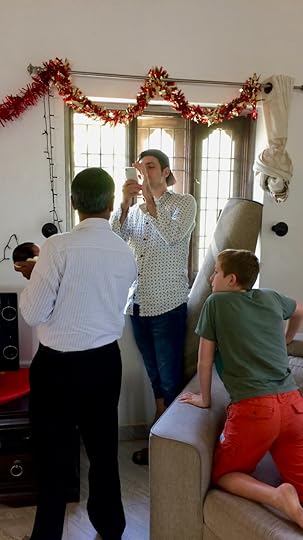 Rocky is an American guy who was touched by the plight of the people living with AIDS when he visited India, and so he sold all his possessions and moved there to help. He married an Indian woman and they just had their second baby.
Rocky is an American guy who was touched by the plight of the people living with AIDS when he visited India, and so he sold all his possessions and moved there to help. He married an Indian woman and they just had their second baby.
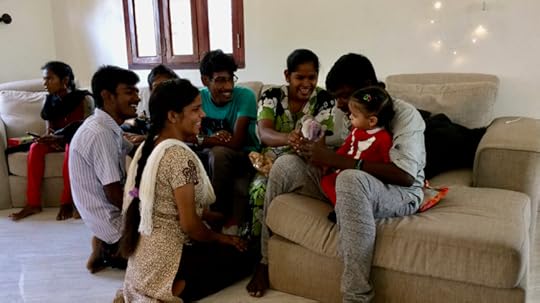
If you watch the two minute trailer HERE of the film Blood Brothers, which won two awards for documentary (Grand Jury and Audience) at the Sundance Film Festival in 2013, you will get it. You will get what Rocky is doing here.
From our short time together, Rocky seemed (to me) to be a laid-back guy with a big heart, which is a perfect – if not necessary – attribute for someone living the life he chose.
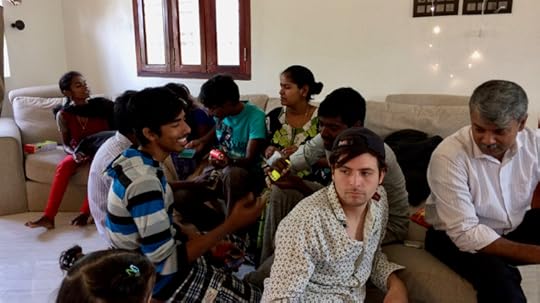
I wanted to spend more time there. I thought we would have a whole day, but our two weeks were sort of chaotic with lots to do and see, and Hisill needed to be back for an afternoon meeting.
In addition, I got my first bout of food poisoning on this trip (out of two) that morning and was miserably nauseous. Then on top of that, I slipped outside their house on a wet, sloping tiled bit and fell hard on my tailbone and elbow, and I could feel my vertebrae crunching and folding into itself like Russian dolls. So I was not able to appreciate the overall experience like I wanted to.
We gave individually-wrapped gifts to everyone there because we wanted them to feel loved and special. They are all teens now, and there is even one young adult couple from the home who married and have a child, who – praise be to God – does not have AIDS.
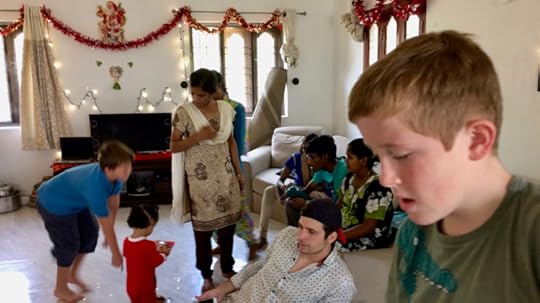
Rocky’s home is where they all get together to receive the support they need to live, work, and get their medical treatment. This area has one of the few hospitals in the country that treats people with AIDS.
We had time enough to spend an hour with them, and then quickly went to visit the nearby buildings where they sleep.
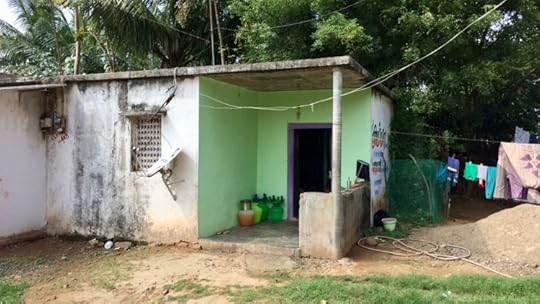
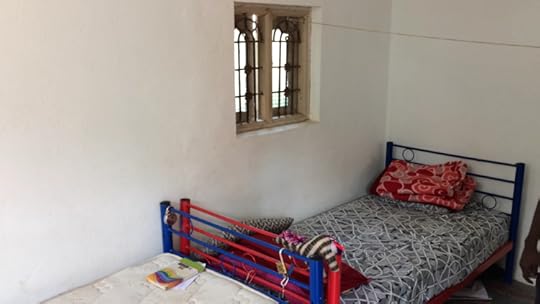
(The girls place was decorated more nicely than the boys). 
January 10, 2017
A 9×9″ Chocolate Cake Recipe
I spent some time looking for a 9×9″ chocolate cake recipe because sometimes you just want a family-sized cake that won’t have you over-indulging for days.

I searched the recipes out there and was not entirely satisfied with what I found. There’s the King Arthur flour recipe, which is vegan (and thus very cool if you’re vegan or have allergies). The downside is that it’s not as tasty, in my opinion, as the old-fashioned variety. The versions I found with butter and egg seemed like they would be rather dry, and the comments on those recipe websites indicated that it was indeed the case. So I made my own version with proportions I thought would work, and was satisfied with the result.
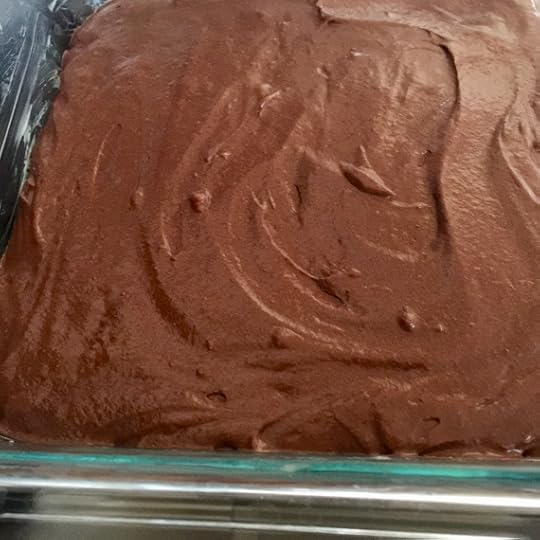
This is a very rich, moist cake with an intense chocolate flavor. You can make it more mild by substituting regular cocoa for the Dutch-process cocoa (which is really rich) and using boiled water in place of espresso. But if you want rich, keep it as it is.
As usual, I made it with a gluten-free flour mix and I’ve noticed that sometimes it falls a bit in the centre when I’m using GF. If you’re not a stickler you won’t mind, and if you’re making it with frosting, you won’t notice. (I suspect if you use regular flour it will be perfect because that’s my experience with other recipes – will you let me know the result if you try it with regular flour?)
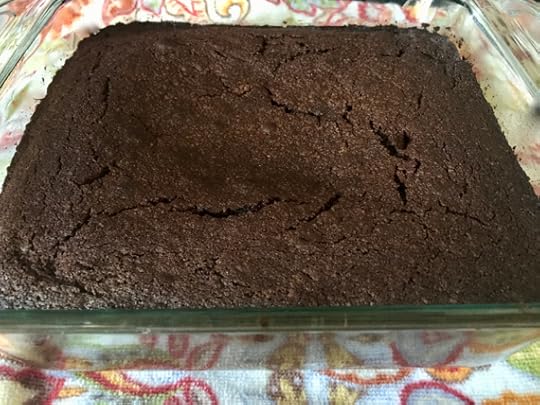
The frosting is made with white chocolate.
 And, you know, together they’re sort of beautiful.
And, you know, together they’re sort of beautiful.
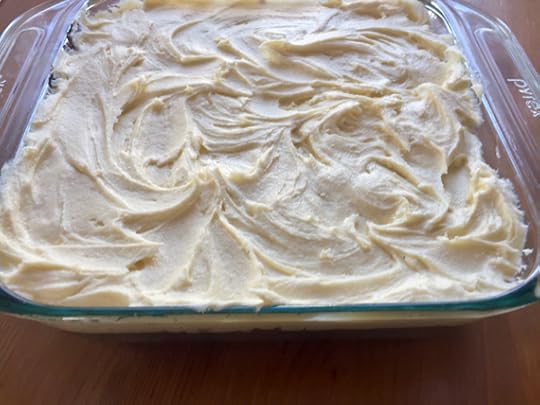 The perfect size for a small family gathering.
The perfect size for a small family gathering.
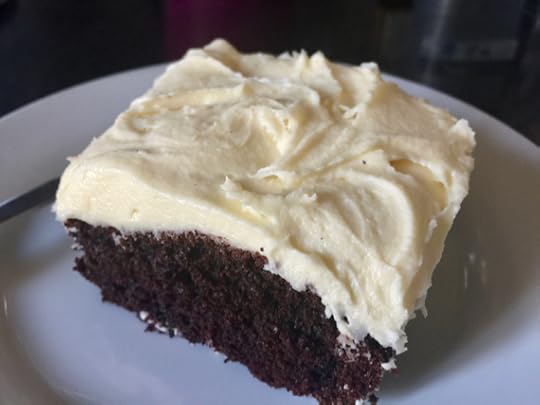
Just, whatever you do, don’t go into sugar hyperdrive by adding sugared gumdrops “fraise tagada” in the form of a heart.

Unless, of course,
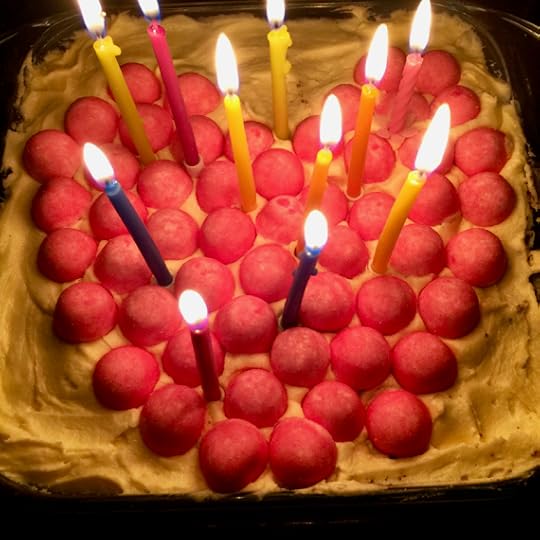
your birthday kid likes that sort of thing.
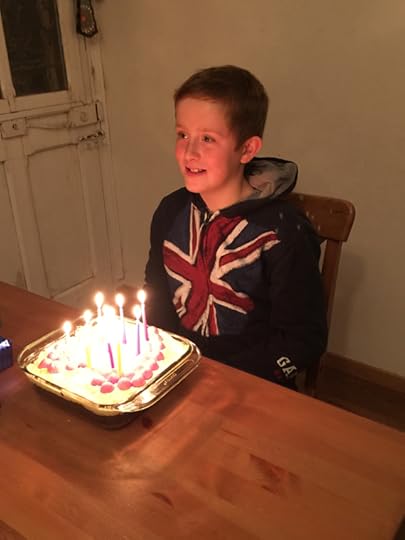
A 9x9" Chocolate Cake Recipe Print Prep time 30 mins Cook time 40 mins Total time 1 hour 10 mins Recipe type: Dessert Serves: 9 Ingredients 1 c flour 1 c sugar ½ c cocoa 1 teaspoon baking soda ¼ teaspoon salt 1 large egg ½ c buttermilk ½ cup butter (113 grams) ¼ c espresso Frosting: 165 grams real white chocolate ½ cup butter (113 grams) 2 cups confectioner sugar 1 teaspoon vanilla Instructions Preheat the oven to 350°F (180°C) and butter the pan. Mix butter (at room temperature) with the sugar. Add the egg, salt, baking soda, cocoa and mix again. Add the flour and buttermilk, and mix. Prepare the espresso (or use boiled water or instant coffee) and mix that in. Pour the batter into the 9x9 pan and put it in the oven. Bake for 40 minutes, turning the pan after 25 (and checking to make sure your oven is not over-cooking it). When the cake is cooled, melt the white chocolate in a bowl for 1 minute in the microwave. Add the softened butter and confectioner sugar and vanilla. Beat together and frost the cake. 3.5.3226
The post A 9×9″ Chocolate Cake Recipe appeared first on A Lady In France.
January 5, 2017
HOPE for These Kids (India, Part II)
My favourite visit was the HOPE school in India. It was nearly an hour away from where we were staying. (Everything was at least an hour away from where we were staying. My entire visit is summed up in the words: “We drove.”).
The reason I loved it most is not because there was a greater need in the school than in other places, but rather because it’s the place we had the most contact with the children.
This is what the school looks like from the outside.
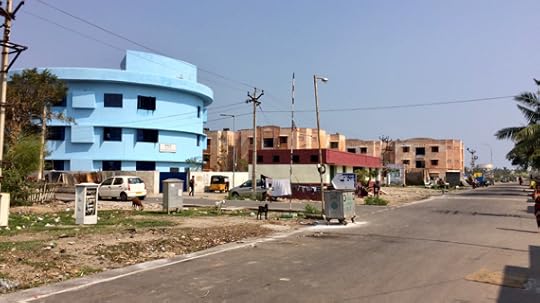
A beacon of hope amid the largest government housing project in all of Asia – 30,000 apartments filled with people who dwell in very small lodging in exchange for having a roof over their heads.
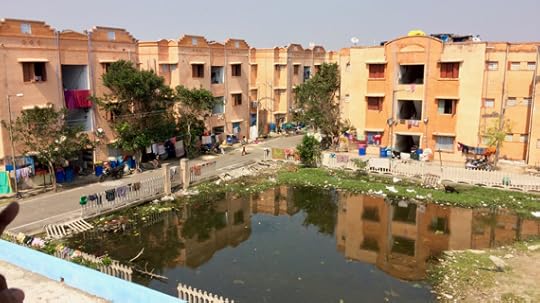
What’s regrettable, however, is that providing housing does not fix the crime levels brought on by poverty. Only education does that.
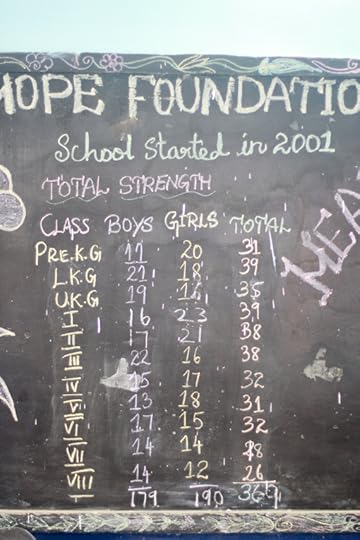
When families move out of the projects on to better conditions, the school asks them to leave their place in the school for another child. There in the back of the photo below you can see a few intrepid local kids climbing the wall to see what all the fuss was about inside. Maybe these are the future students of Hope.
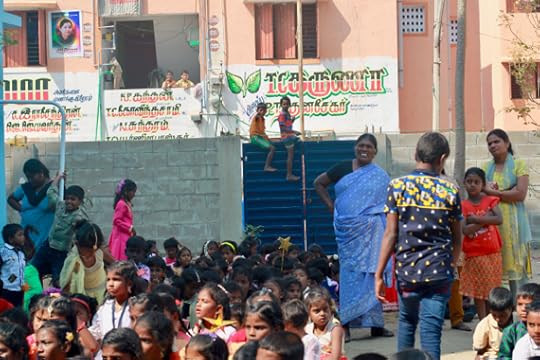 When we first arrived, we were met with the entire school sitting on the playground, dressed in their finest party clothes. As honoured guests, we were shown to a head table, draped in white. Gabriel took one look at the table and the empty chairs waiting for us and said, “Seriously?”
When we first arrived, we were met with the entire school sitting on the playground, dressed in their finest party clothes. As honoured guests, we were shown to a head table, draped in white. Gabriel took one look at the table and the empty chairs waiting for us and said, “Seriously?”
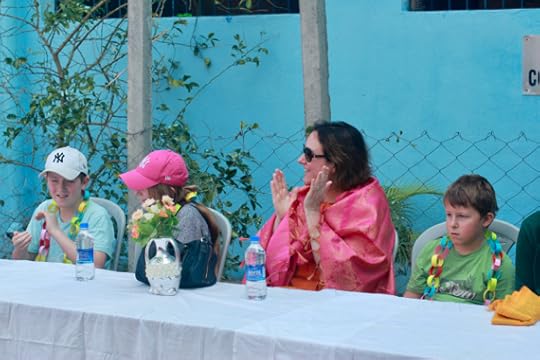
As we watched each class stand up and sing an ESL version of various Christmas carols, I couldn’t help but be moved and was grateful for the large sunglasses which hid my tears. The tears were, in large part, due to the fact that I had only just, that morning, learned of the sudden death of my friend back in France. She’d had a miraculous recovery from her second bout of breast cancer, but died suddenly of liver failure and I was going to miss her funeral. This was my second friend to lose her life suddenly to cancer in the space of one month.
There was the life and hope of these kids set against the backdrop of death and despair. They are bathed in crime and harsh conditions. Some witness murders outside the school gates in broad daylight. And just a couple weeks before, the local police station was burned to the ground. But their singing and smiles forced my attention on the hope and not on the despair. My friend would most heartily have approved.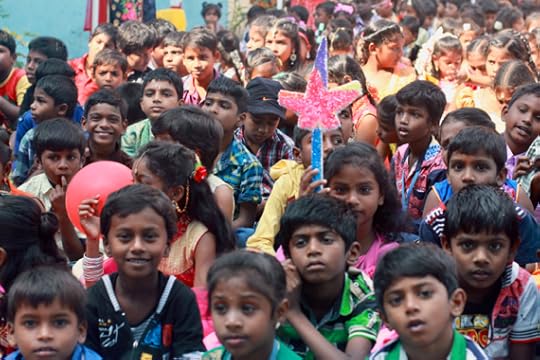
The children speak Tamil, and in the school they learn English. I’m not sure if they also learn the national language, Hindi. They come from Hindu backgrounds so the English and the Christmas traditions are foreign to them. However, a proper English training will give them the best chance at succeeding once they leave the school.
There was the nativity scene.
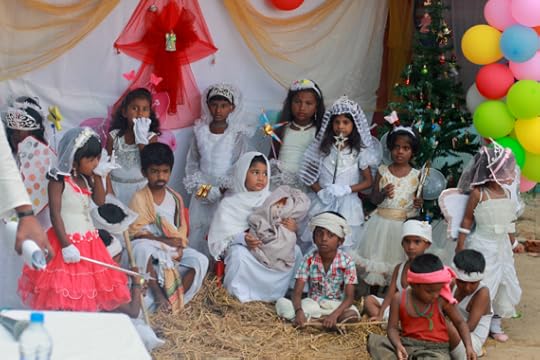
And then there was this strange-looking guy throwing candy … an event they could all get behind.
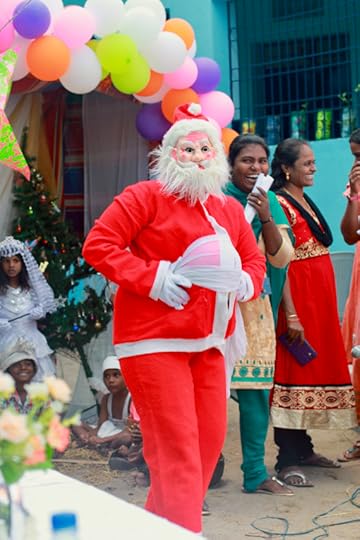
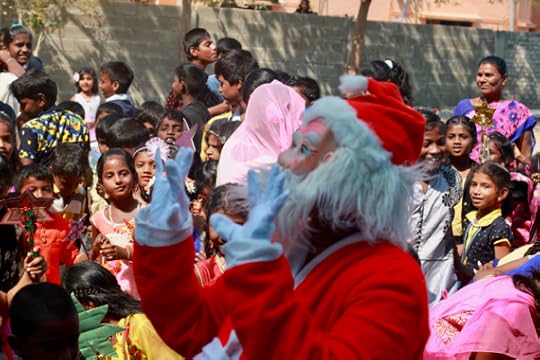 The highlight for us came when we got to pull out all the donations we had collected and lugged with us to India. (Thank you to our church in Paris and a few friends and neighbours who participated).
The highlight for us came when we got to pull out all the donations we had collected and lugged with us to India. (Thank you to our church in Paris and a few friends and neighbours who participated).
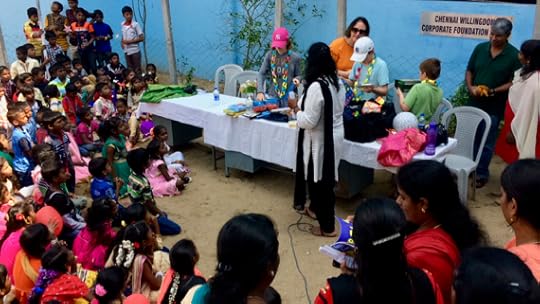
The kids then went inside and were given cake and candy (donated by our friend, Hisill), which our children got to distribute.
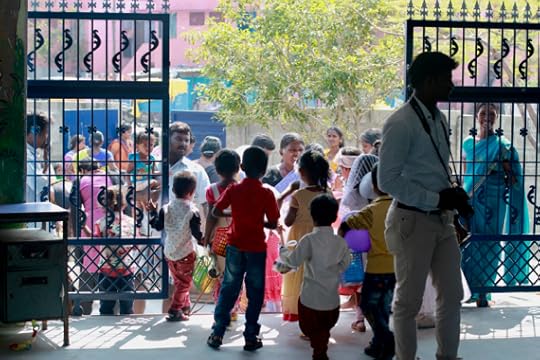
Our children loved that as much as the schoolkids did. And I loved watching them, thinking – this THIS is why we came.
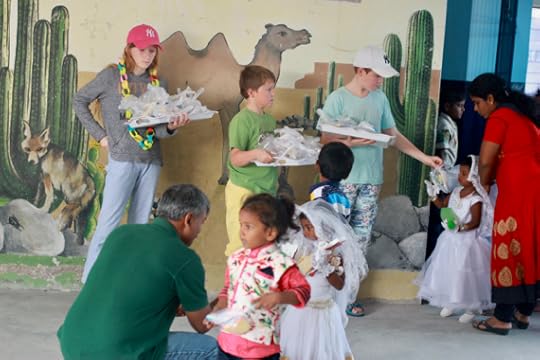
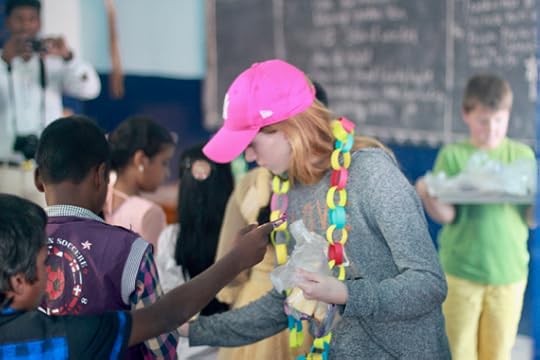
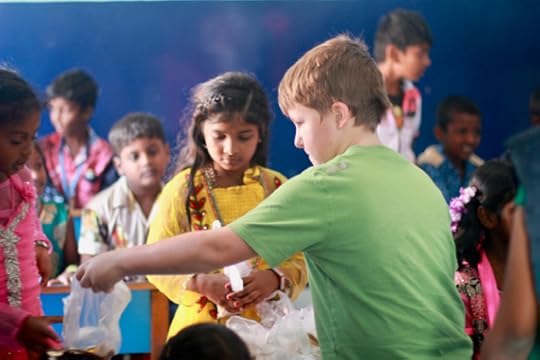
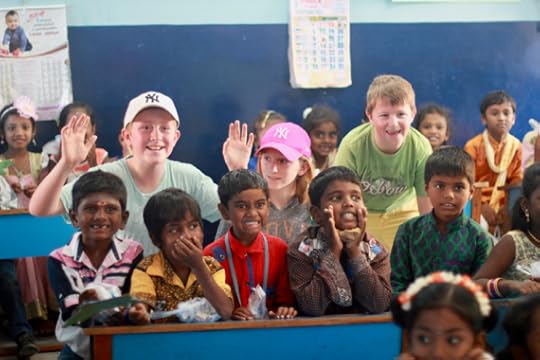
At the close of our morning, I spoke with the director of the school and she said what they need are teaching supplies. I recommended using BrainQuest and Super Simple Songs, which I loved as an ESL teacher but she said the cost is prohibitive. After reflecting on this, I had an idea and I’m hoping you, my dear readers, can help.
I’ve created a wishlist of teaching supplies using Amazon India, most of which are under $10. If you are willing to contribute, a small donation on your part would make a huge difference for the school. I’ve included detailed instructions for how to do so below.
In compiling the list, I included all the BrainQuest materials (they’re not shown at the head of the list because I added them first, but I marked them as highest priority – those are the most urgent). I also included some classic children’s books. And – in full disclosure – included mine (Happy People Everywhere) since I’d offered one copy and she asked if I had any others. I had already donated them to other places in India.
If you have a good idea of what other teaching supplies (not on the list) would be helpful – CDs, books, games – and wish to purchase that instead, please send me an e-mail or leave a comment with a link. I will add it to the wishlist and you can purchase it following that. OR you may simply be able to purchase on item already on the list, select the HOPE address and add any supplementary items you’ve chosen.
If you feel more comfortable using Amazon.com and seeing everything in USD (and don’t mind paying the shipping, which might be as much as the item), let me know and I’ll give you the direct address.
Here is the link (click the large box below) and below that are the instructions. I’ve purchased a couple items from the wishlist to ensure that my instructions are detailed and easy to follow.
DETAILED INSTRUCTIONS:
a) Click on the box above and it will take you to the Amazon India website, directly to the items on the wishlist for the HOPE school.
b) Log on to Amazon India with your usual logon e-mail and password that you use for your usual Amazon site.
c) Choose the item or items you wish to purchase. You’ll see the amounts are in Indian rupees. There are 68 rupees to one US dollar, which means if you purchase a book for 680 rupees, you’re buying something for $10. There are plenty of items on the list for under 200 rupees, which means you’ll only be paying a couple of dollars that will make a huge difference to the kids and teachers.
d) Most will not require shipping fees, but if it does or you’ve purchased more than one item and want to check the total of what you’re spending (beyond using a calculator), go to the currency exchange website (link here) and choose IND rupee to USD. Put the total rupee amount in the box, click enter, and it will give you how much you’re spending in US dollars.
e) When ready to purchase, you’ll see all your usual addresses from your own Amazon site and among them, you’ll see the HOPE School address. Click “Ship to this address”.
f) Your saved credit cards will be there, but since you’re shipping to a new address, you’ll be asked to verify your credit card by reentering the number.
g) Finalize the sale by clicking confirm order and the product will ship!
Thank you for your support, most sincerely.

The post HOPE for These Kids (India, Part II) appeared first on A Lady In France.
January 3, 2017
Postcards From India
Hi friends. We’re back from India as of Sunday night and not fully adjusted. There’s the cold – it was much warmer when we left (and obviously much hotter where we were) – the jet lag, and the inevitable flu/colds/stomach upset that we’re all experiencing to some degree. I think the overwhelming family feeling is gratitude to have had the experience and an even greater gratitude to be back. Perhaps over time, the two sentiments will reverse themselves.
I asked each of the kids what they liked about India, what they didn’t like, and what they’re grateful for.
Juliet said:
Liked the elephants and monkeys and swimming in the local pool (she needed to buy a special bathing suit with a skirt and short sleeves). Disliked the motion sickness and all the travel (we drove a lot within the country) and being cold at night from the fan with only a sheet to cover her. And she was grateful to be back.
Gabriel said:
Liked the elephants and spending time with the Andrews family. Disliked the mosquitos. Was grateful to be back.
William was more loquacious:
Liked the elephants, spending time with the Andrews, and getting to see so many things. Disliked the mosquitos. He counted 34 bites and that was with the Deep Woods Off we brought with us. Was grateful for the presents (they each got two 10€ gifts for Christmas) and that God brought us back “sain et sauf” (safe and sound).
As for me … I’m still processing. It was a tough journey for me, requiring lots of leaning on God. My most frequent prayer was Psalm 16:1.
Keep me safe, my God,
for in you I take refuge.
When the driving was nuts (we fortunately only had one collision that resulted in a fender bender, but no danger to our person), and the toilets were frightening, and we were venturing yet again into the great unknown, I reminded God that I took refuge in HIM. He was faithful.
For lack of words to sum things up, here are some of the pictures from our trip. The first is from the Bay of Bengal on the coast of Pondicherry. (A former French colony).
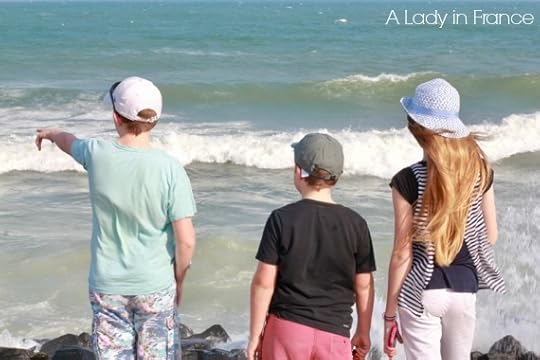
In the same town, there is the statue of Gandhi.
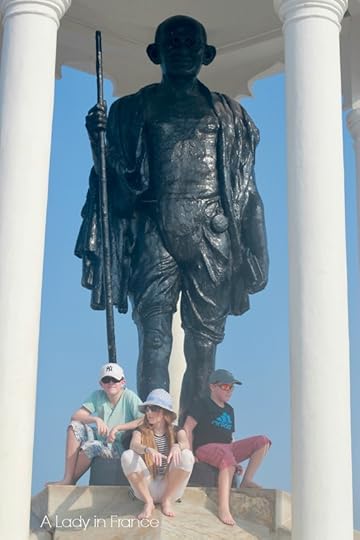 And a beautiful park for the kids to play in
And a beautiful park for the kids to play in
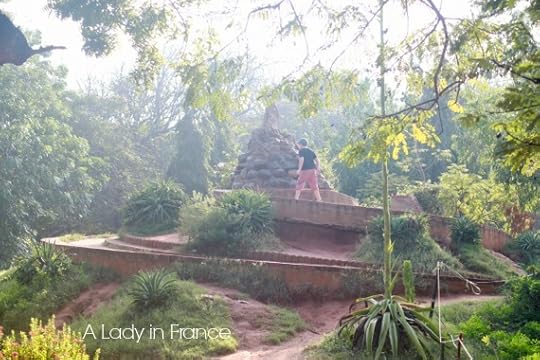 and a Hindu temple where people come to get blessed by an elephant.
and a Hindu temple where people come to get blessed by an elephant.
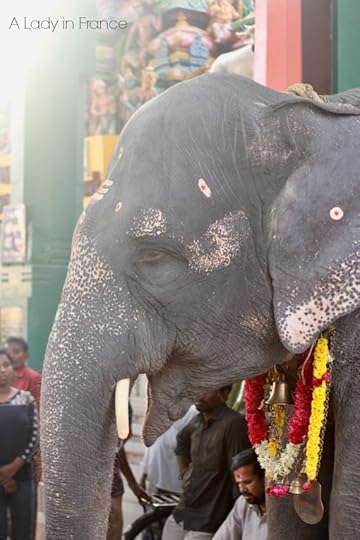 Here are our friends, Jobby and Hisill, on the tea hills of Kerala.
Here are our friends, Jobby and Hisill, on the tea hills of Kerala.
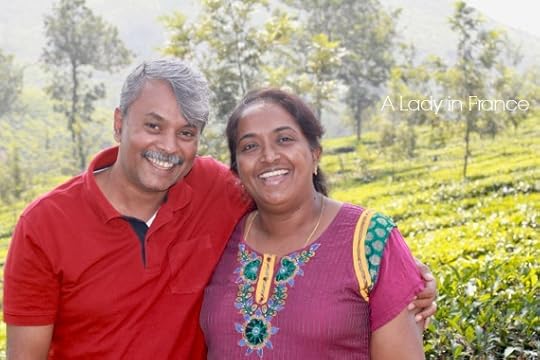
(They were sooooo good to us).
And us. 




